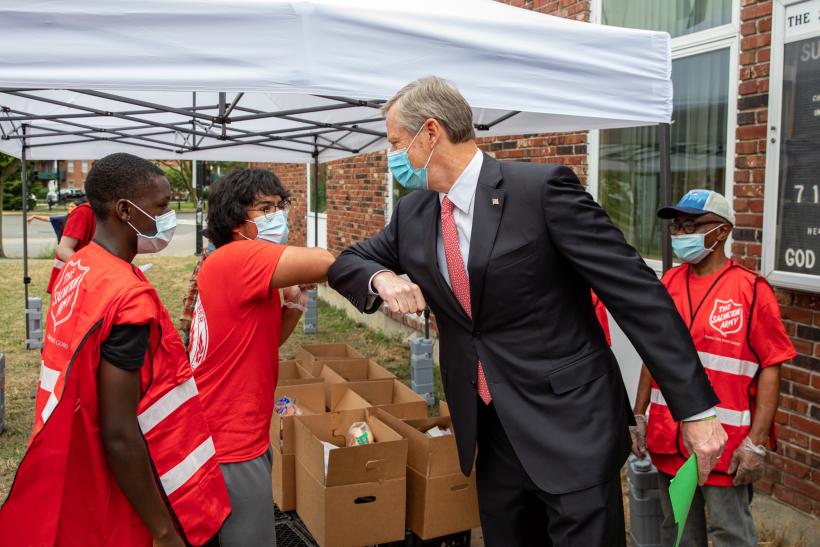Black Sheep Deli And Queen’s Greens Receive Grants to Improve Local Food Security

Governor Charlie Baker at a Salvation Army Food Distribution. during the COVID-19 pandemic. Photo: mass.gov
Source: mass.gov
Two Amherst businesses have received state grants to improve local food security. The Black Sheep Deli http://www.blacksheepdeli.com received $98,000 to transition their dine-in space into a small food market to provide groceries in an area without other grocery options. Queen’s Greens https://www.queensgreensfarm.com received $ 106,000 to build three new tunnel greenhouses for growing spinach in the winter. This will enable them to increase production and serve approximately 25 percent more customers. They also received $20,982 to purchase farm and greenhouse equipment for growing and distributing greens throughout the winter.
The grants address urgent food insecurity for Massachusetts residents as a result of the COVID-19 pandemic and to help make the Commonwealth’s food system more resilient. This funding is being awarded as part of the second round of the new $36 million Food Security Infrastructure Grant Program, created following recommendations from the state’s COVID-19 Command Center’s Food Security Task Force, which promotes ongoing efforts to ensure that individuals and families throughout the Commonwealth have access to healthy, local food.
“Increasing access to fresh, local food is critical to ensure the health and well-being of all Commonwealth families,” said Governor Charlie Baker. “Through this grant program, we are helping residents and businesses who’ve been impacted by the COVID-19 pandemic, while making investments in building a strong and equitable local food system for Massachusetts.”
The program also seeks to ensure that farmers, fishermen, and other local food producers are better connected to a strong, resilient food system to help mitigate future food supply and distribution disruption.
This second round of the grant program includes 34 awards totaling $3,324,349 to fund investments in technology, equipment, increased capacity, and other assistance to help producers distribute food, especially to food insecure communities. Considerations for evaluating applications included equity, economic impact and need, sustainability and scalability of efforts, and ability to support producer readiness to accept SNAP and HIP benefits. This round follows the first round of $2,941,838 in grants awarded last month to 26 recipients.
